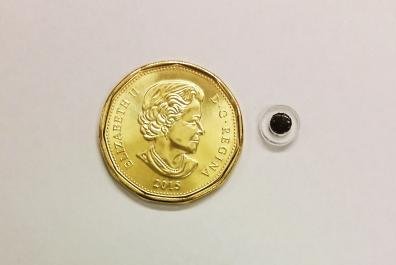Researchers at the University of British Columbia have developed a magnetic drug implant, right, that can deliver medication to patients. The device is surgically implanted and then triggered to release medication when a magnet is placed over it. Photo courtesy of UBC
Feb. 14 (UPI) -- Researchers at the University of British Columbia have created a first-of-its-kind magnetic drug implant to improve medication delivery to patients.
The 6 millimeter implant consists of a silicone sponge with magnetic carbonyl iron particles wrapped in a round polymer layer. Medication is injected into the device and then surgically implanted. Doctors can activate the device by passing a magnet over the patient's skin, which deforms the sponge and releases the drug into surrounding tissue.
"Drug implants can be safe and effective for treating many conditions, and magnetically controlled implants are particularly interesting because you can adjust the dose after implantation by using different magnet strengths," Ali Shademani, Ph.D., a student in the biomedical engineering program at UBC and author of the study, said in a press release. "Many other implants lack that feature."
Researchers tested the device on animal tissue using the prostate cancer drug docetaxel and found it was effective in delivering the drug on demand repeatedly. The implant also was effective in delivering the drug to cancer cells compared to freshly administered docetaxel.
This new device could have significant health impacts on diseases like diabetes, where a required dose and timing of insulin varies from patient to patient.
"This device lets you release the actual dose that the patient needs when they need it, and it's sufficiently easy to use that patients could administer their own medication one day without having to go to a hospital," John K. Jackson, a research scientist in UBC's faculty of pharmaceutical sciences and co-author of the study, said in a press release.
Researchers said that the device could be expanded for use with a wide variety of medications.
"This could one day be used for administering painkillers, hormones, chemotherapy drugs and other treatments for a wide range of health conditions," Mu Chiao, a professor of mechanical engineering at UBC, said in a press release. "In the next few years we hope to be able to test it for long-term use and for viability in living models."
The study was published in Advanced Functional Materials.















